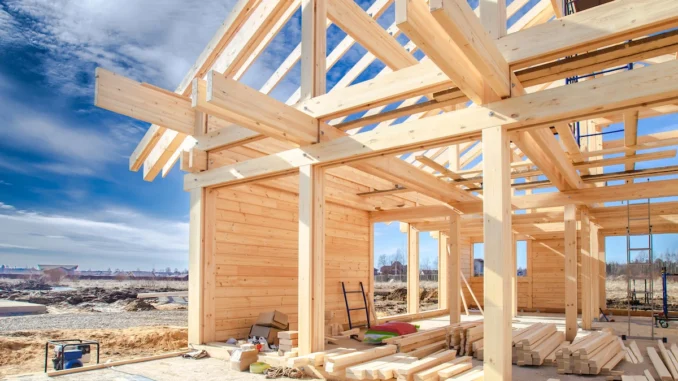
Temperatures are slowly starting to rise in many parts of the country as we head into spring — and so is homebuilder sentiment, according to the National Association of Home Builders (NAHB)/Wells Fargo Housing Market Index (HMI) report, released Wednesday.
In February, builder confidence in the market for newly built single-family homes rose seven points from January’s reading, to an index value of 42. This is the second consecutive month of gains after a year of decreases, and it is the index’s strongest reading since September 2022.
The NAHB/HMI report is based on a monthly survey of NAHB members, in which respondents are asked to rate both current market conditions for the sale of new homes and expected conditions for the next six months, as well as traffic of prospective buyers of new homes. Scores for each component of the builder confidence survey are then used to calculate an index, with any number greater than 50 indicating that more homebuilders view conditions as favorable than not.
The NAHB attributes the increase to the slight easing of mortgage rates, which the trade organization feels is a signal that the housings market might be turning, despite builders still dealing with high construction costs and supply chain issues.
“With the largest monthly increase for builder sentiment since June 2013, the HMI indicates that incremental gains for housing affordability have the ability to price-in buyers to the market,” Alicia Huey, an NAHB chairman, said in a statement. “The nation continues to face a sizeable housing shortage that can only be closed by building more affordable, attainable housing. However, the two monthly gains for the HMI at the start of 2023 match the cautious optimism noted by the large number of builders at the recent International Builders’ Show in Las Vegas, who reported a better start to the year than expected last fall.”
According to Huey, the most challenging part of the homebuilding market is the construction of entry-level homes, and he called on policymakers to “help by reducing the cost of developing lots and building homes via regulatory reform.”
Builders are continuing to offer a variety of incentives. However, data shows that things may be stabilizing. In November, 36% of builders were reducing home prices, but the percentage of builders who are dropping home prices declined to 31% in February. In addition, the average price drop decreased from 8% in December to 6% in February.
“While the HMI remains below the breakeven level of 50, the increase from 31 to 42 from December to February is a positive sign for the market,” Robert Dietz, the NAHB’s chief economist, said in a statement. “Even as the Federal Reserve continues to tighten monetary policy conditions, forecasts indicate that the housing market has passed peak mortgage rates for this cycle. And while we expect ongoing volatility for mortgage rates and housing costs, the building market should be able to achieve stability in the coming months, followed by a rebound back to trend home construction levels later in 2023 and the beginning of 2024.”
Three other indices monitored by the NAHB also posted gains in February. The gauge measuring current sales conditions rose to 46, up six points month over month. The component analyzing sales expectations for the next six months rose 11 points to a reading of 48, and the index that charts traffic of prospective buyers rose six points from January to a reading of 29.
Regionally, the three-month moving averages for HMI rose in all four regions, with the West gaining three points to a reading of 30, the South rising four points to 40, the Northeast adding four points for a reading of 37 and the Midwest rising one point to a reading of 33.
Another survey, the BTIG/HomeSphere State of the Industry Report, also reported a leveling in homebuilder outlook.
According to the survey, 54% of builders saw a yearly decrease in sales last month, down from 71% in December. Despite a 41% yearly decrease in sales, builders again reported a slight improvement in performance relative to expectations, with 21% of respondents reporting that sales were better than expected, and 38% reporting that sales were worse than expected. These metrics improved from 11% and 35%, respectively, in December.
The BTIG/HomeSphere study is an electronic survey of approximately 50-100 small- to mid-sized homebuilders that sell, on average, 50-100 homes per year throughout the nation. In January, the survey had 107 respondents.
The January survey included a special question about the impact of mortgage rates, with 80% of builders reporting that lower rates have positively impacted business.
“Conditions continue to be sluggish overall, but we believe the environment is improving heading into the Spring selling season,” BTIG analyst Carl Reichardt said in a statement.



